Mary Bennet and Mr. Collins
In Jane Austen’s novel, Pride and Prejudice, several of the characters make good matches, not just financially, but emotionally and romantically. Elizabeth marries Mr. Darcy, and Jane marries Mr. Bingley. Other matches are more complicated, like Lydia’s marriage to Mr. Wickham, and Charlotte Lucas’ marriage to Mr. Collins. In fact, many readers have wondered if Mary Bennet and Mr. Collins might not have been more suited for each other. Why didn’t Mr. Collins marry Mary Bennet? And if they had married, would it have been a good match?
It’s Jane Austen’s fault that these questions are asked, for she planted seeds for these speculations in the text. At the same time, she clearly demonstrates what led Mr. Collins to choose Charlotte Lucas as his bride rather than turning to Mary Bennet. Let’s look at the sequence of events, as conveyed in the book:
- Mr. Collins proposes to Elizabeth.
- Elizabeth turns down Mr. Collins.
- Mrs. Bennet congratulates Mr. Collins on his engagement to her daughter. He explains that she turned him down, but that he also believes that despite her refusal, Elizabeth actually intends to marry him.
- Mrs. Bennet attempts to convince her husband to force Elizabeth to marry Mr. Collins. When Mr. Bennet refuses to do so, she tries—and fails—to convince Elizabeth on her own.
- Charlotte Lucas comes to visit the Bennets and finds the house in an uproar. Mr. Collins shows Charlotte civility, and she politely pretends not to notice the hubbub about the failed marriage proposal.
- Mr. Collins spends the rest of the day trying to ignore Elizabeth, and spends much of the time talking to Charlotte Lucas: “the assiduous attentions which he had been so sensible of himself were transferred for the rest of the day to Miss Lucas, whose civility in listening to him was a seasonable relief to them all, and especially to her friend.”
- The next day, the Bennets eat dinner with the Lucases, and Charlotte is so kind as to entertain Mr. Collins. (Austen lets us know that Charlotte’s actual “object was nothing less than to secure [Elizabeth] from any return of Mr. Collins’s addresses, by engaging them towards herself.”)
- The next morning—his very last day visiting Meryton—Mr. Collins walks towards Lucas Lodge. Upon seeing him from the window, Charlotte contrives to “accidentally” run into him in the lane. Mr. Collins proposes to Charlotte, and Charlotte accepts.
An 1894 illustration by George Allen of Mr. Collins proposing to Charlotte Lucas with “so much love and eloquence.” (Image in public domain; accessed through Wikimedia Commons)
- That evening, after becoming engaged to Charlotte Lucas, Mr. Collins must say farewell to the Bennets. He does not inform them of his engagement, but he does offer them his gratitude, affections, and wishes of health and happiness, even making a point not to exclude Elizabeth. Then he informs them that he plans to return soon to Longbourn, and the narrator finally tells us how Mary Bennet feels about the whole affair:
With proper civilities, the ladies then withdrew; all of them equally surprised to find that he meditated a quick return. Mrs. Bennet wished to understand by it that he thought of paying his addresses to one of her younger girls, and Mary might have been prevailed on to accept him. She rated his abilities much higher than any of the others: there was a solidity in his reflections which often struck her; and though by no means so clever as herself, she thought that, if encouraged to read and improve himself by such an example as hers, he might become a very agreeable companion. But on the following morning every hope of this kind was done away. Miss Lucas called soon after breakfast, and in a private conference with Elizabeth related the event of the day before.
Poor Mary Bennet.
Unlike her sisters, she actually values Mr. Collins’ abilities—or at least, “rated [them] much higher” than her sisters did. She is often—key word, often—struck by the “solidity in his reflections.” She does not think he is as intelligent or clever as she is, but she sees in him potential. He could read and improve himself. Even if he is not truly agreeable now, “he might become a very agreeable companion.”
Alas, Mary admits her feelings to herself to late to act on them. And even if she had admitted her feelings for Mr. Collins earlier, she would be unlikely to actively and swiftly pursue him, as Charlotte Lucas does. It is Charlotte’s willingness to converse with Mr. Collins, and then her direct pursuit of him, that leads to their marriage.
In one of my favorite card games, Marrying Mr. Darcy, Charlotte Lucas starts the game with a score of three cunning, which is rather fitting. (In the game, none of other characters start with any cunning, though they can acquire it throughout the game.)
In Melissa Leilani Larsen’s fabulous stage version of Pride and Prejudice, Mary actually makes Mr. Collins a pudding, which she is about to give him when she is cast out of the room by her mother so that he can propose to Elizabeth. I saw a Zoom production of the play in early 2021, and the way Mary said “But he hasn’t tried my pudding” almost brought me to tears. In this adaptation, Mary’s realization of her feelings for Mr. Collins comes earlier, but still too late.
Now let’s dive into the text of Pride and Prejudice to consider seven arguments for why Mr. Collins should have married Mary Bennet, and seven arguments on why that would have been a bad idea.
Arguments for a happy union between Mr. Collins and Mary Bennet, aka, why he should have married her
- Mary is interested in Mr. Collins, sees his positive qualities, and believes he could become an agreeable companion—and is not interest a base upon which something more substantial can be built?
- Mr. Collins doesn’t really care which sister he marries. He transfers his interest easily from Jane to Elizabeth upon a gentle nudge from Mrs. Bennet. Mary is also a Bennet sister! Could he not shift his interest to her?
“Mr. Collins meant to choose one of the daughters.” A humorous 1894 illustration of the five sisters, one of whom Mrs. Bennet has marked as unavailable, by Hugh Thomson. (Source: Wikimedia Commons, Creative Commons license.)
- They have similar speaking habits: Mr. Collins like to wax eloquently about any subject, and Mary likes to make profound statements on life. Neither individual is as clever, intelligent, or witty as they think themselves.
During a dinner conversation, Mr. Collins mentions that he frequently compliments Lady Catherine de Bourgh and her daughter.
Mr. Bennet says:
“It is happy for you that you possess the talent of flattering with delicacy. May I ask whether these pleasing attentions proceed from the impulse of the moment, or are the result of previous study?”
Mr. Collins replies with one of the best lines from the novel:
“They arise chiefly from what is passing at the time; and though I sometimes amuse myself with suggesting and arranging such little elegant compliments as may be adapted to ordinary occasions, I always wish to give them as unstudied an air as possible.”
Both Mr. Bennet and Elizabeth find his reply pleasingly absurd.
Earlier in the novel, after the Meryton assembly, Elizabeth is complaining of Mr. Darcy’s behavior to her sisters and Charlotte Lucas. Elizabeth says,
“I could easily forgive his pride, if he had not mortified mine.”
Mary immediately gives a long speech on pride, which, while it contains some insights, does not truly add to the conversation:
“Pride,” observed Mary, who piqued herself upon the solidity of her reflections, “is a very common failing, I believe. By all that I have ever read, I am convinced that it is very common indeed; that human nature is particularly prone to it, and that there are very few of us who do not cherish a feeling of self-complacency on the score of some quality or other, real or imaginary. Vanity and pride are different things, though the words are often used synonymously. A person may be proud without being vain. Pride relates more to our opinion of ourselves; vanity to what we would have others think of us.”
No one acknowledges Mary’s statement, nor does it shift anyone’s views on the subject at hand.
- Neither Mr. Collins nor Mary completely fit into society. Both have trouble understanding and behaving appropriately in social situations, such as when Mr. Collins introduces himself to Mr. Darcy at the ball, and, at the very same ball, Mr. Bennet must stop Mary from performing on the pianoforte. Mary seems to have an innate social awkwardness and lack of awareness, and Mr. Collins’ deficits are caused, at least in part, by his upbringing and education.
- Mary is bookish, and Mr. Collins likes reading religious tracts and books.
- Mr. Collins is a clergyman, and Mary cares deeply about moral values.
- They are both judgmental. After Lydia runs away with Wickham, Mary declares,
“Loss of virtue in a female is irretrievable, that one false step involves her in endless ruin, that her reputation is no less brittle than it is beautiful, and that she cannot be too much guarded in her behaviour towards the undeserving of the other sex.”
And in a letter, Mr. Collins writes,
“The death of your daughter would have been a blessing in comparison of this.”
Ouch. That’s harsh.
As we consider these seven reasons, we find ourselves asking:
What better foundation for marriage is there than social ineptitude, bookishness, and a healthy dose of self-righteousness?
Mary and Mr. Collins do share some fundamental values, and both relate to people in a distinctive way. And this could be enough to argue that they would be well suited.
In Jack Caldwell’s novel The Companion of His Future Life, Mr. Collins does marry Mary Bennet. While the novel still focuses on the stories of Elizabeth and Jane, we see a fair bit of Mary, and both she and Mr. Collins seem quite satisfied with their choice. As a result of their marriage, Mary grows in new ways. She does not let Lady Catherine de Bourgh control her life, and goes behind her back to become close friends with Anne de Bourgh.
Arguments against a happy union between Mr. Collins and Mary Bennet, aka, why it’s a good thing he married Charlotte Lucas
- Being similar does not actually mean you are suited. Were they to marry, their similarities could cause them trouble in the future, particularly since they both struggle in social situations.
- Mr. Collins is actually a lot less bookish than Mary. He’s not as well read, and even Mary, with her inability to see how to apply her knowledge, can see that he is lacking in this area:
Though by no means so clever as herself, she thought that, if encouraged to read and improve himself by such an example as hers, he might become a very agreeable companion.
- Mr. Collins needs someone to manage him. He already follows Lady Catherine de Bourgh’s every suggestion. After his marriage to Charlotte, she helps him restrain some of his less-desirable tendencies in ways that make her life better:
To work in his garden was one of his most respectable pleasures; and Elizabeth admired the command of countenance with which Charlotte talked of the healthfulness of the exercise, and owned she encouraged it as much as possible.
Would Mary be able to do this in the same subtle yet effective manner? It is likely that she’d choose a different, more direct tact. Yet some of the reason Charlotte and Mr. Collins’ marriage works is because he does not feel any friction. At the end of Elizabeth’s six-week visit, Mr. Collins says:
“Only let me assure you, my dear Miss Elizabeth, that I can from my heart most cordially wish you equal felicity in marriage. My dear Charlotte and I have but one mind and one way of thinking. There is in everything a most remarkable resemblance of character and ideas between us. We seem to have been designed for each other.”
Unlike Charlotte, Mary is not strategic in being tactful, and Mary would likely directly tell Mr. Collins if she disagreed with him. This would create a very different marriage, one with the potential for conflict.
- Even after his marriage, Lady Catherine is the most important person in Mr. Collins’ life. Charlotte is willing to praise Lady Catherine, be quiet during large portions of meals with her, and ignore any difficulties she causes in her life.
While it’s possible Mary could do the same (and in Caldwell’s novel, she not only does that, but also manages to subtly influence Lady Catherine in ways that help her meet her own goals), it’s just as possible that Mary would follow the path of Elizabeth and state her mind to Lady Catherine. When Elizabeth speaks up to Lady Catherine, it causes great consternation on the part of Mr. Collins, and he would likely be even more upset if it were his wife disagreeing with her.
- Mary wants Mr. Collins to change (“to read and improve himself”). Could Mr. Collins change in a way that would suit Mary?
In her novels, Jane Austen is open to the idea of people changing, but this change generally happens before marriage. For instance, inspired by Elizabeth’s critique, Mr. Darcy lets go of his pride:
“I have been a selfish being all my life, in practice, though not in principle. As a child I was taught what was right, but I was not taught to correct my temper. I was given good principles, but left to follow them in pride and conceit….Such I was, from eight to eight-and-twenty; and such I might still have been but for you, dearest, loveliest Elizabeth! What do I not owe you!”
- A large part of Charlotte and Mr. Collins’ marital harmony is due to Charlotte’s ability to ignore that which she doesn’t like in her husband. When Elizabeth visits, she watches their interactions:
When Mr. Collins said anything of which his wife might reasonably be ashamed, which certainly was not seldom, she involuntarily turned her eye on Charlotte. Once or twice she could discern a faint blush; but in general Charlotte wisely did not hear.
Being able to largely ignore the little bothers in each other is of great service to other relationships as well (Mr. Bennet must do the same for Mrs. Bennet). This is something Mary would need to learn.
- Mary’s interests thus far have been to devote as much time to her studies and the piano as possible. She seems ill-prepared to manage a household, while Charlotte is ready and willing to do so. Mary would need to develop those skills and, by necessity of not having many servants, would need to take time from her books and devote herself to running a house. This is something she would need to learn if she ever marries anyone. But because it is something Charlotte already has mastered, and that she finds intrinsic value in, this is a source of joy for her.
When Elizabeth leaves after her six week visit, she reflects:
Poor Charlotte! it was melancholy to leave her to such society! But she had chosen it with her eyes open; and though evidently regretting that her visitors were to go, she did not seem to ask for compassion. Her home and her housekeeping, her parish and her poultry, and all their dependent concerns, had not yet lost their charms.
One of my favorite novels which explores Charlotte’s perspective, with its joys and struggles, is The Clergyman’s Wife. Even for Charlotte, even with her need for security, it is not an easy path.
In looking at these seven reasons, Mary seems ill-suited for Mr. Collins. Charlotte already has the perspective and the skills to make matrimony to Mr. Collins be as smooth as possible, while if Mary were to marry Mr. Collins, their path would be bumpy, at least at the start.
Reflections on Marriage: What we can learn from the marriages that did and did not occur
Any marriage requires give and take, and if the marriage of Mr. and Mrs. Bennet is a good indication, there are plenty of workable marriages in which the two individuals are not particularly suited for each other. Whether or not the pros outweigh the cons, or the cons outweigh the pros, ultimately Mary Bennet and Mr. Collins could have had a tolerable, successful, or perhaps even joyful marriage.
Regardless of whether they would have been suited for each other, Charlotte took the initiative and as a result, married Mr. Collins. From a story standpoint, this is powerful, because while Elizabeth doesn’t think highly of Mary’s life philosophies, Charlotte Lucas is her close friend. Charlotte and Mr. Collins’ engagement shakes Elizabeth.
When speaking to her sister Jane of Charlotte’s impending marriage, Elizabeth declares:
“It is unaccountable! in every view it is unaccountable!”
“My dear Lizzy, do not give way to such feelings as these. They will ruin your happiness. You do not make allowance enough for difference of situation and temper. Consider Mr. Collins’s respectability, and Charlotte’s prudent, steady character. Remember that she is one of a large family; that as to fortune it is a most eligible match; and be ready to believe, for everybody’s sake, that she may feel something like regard and esteem for our cousin.”
“To oblige you, I would try to believe almost anything, but no one else could be benefited by such a belief as this; for were I persuaded that Charlotte had any regard for him, I should only think worse of her understanding than I now do of her heart. My dear Jane, Mr. Collins is a conceited, pompous, narrow-minded, silly man: you know he is, as well as I do; and you must feel, as well as I do, that the woman who marries him cannot have a proper way of thinking. You shall not defend her, though it is Charlotte Lucas. You shall not, for the sake of one individual, change the meaning of principle and integrity, nor endeavour to persuade yourself or me, that selfishness is prudence, and insensibility of danger security for happiness.”
Later, when Elizabeth visits Charlotte and Mr. Collins, she comes to accept—perhaps even understand—Charlotte’s choice, despite knowing that she would never have been able to make such a choice herself. She thinks, “Poor Charlotte!,” but her anger for her friend’s choice has been replaced by melancholy.
Elizabeth does not adopt Charlotte’s outlook on life—if she had, she would have accepted Mr. Darcy’s first proposal, despite her dislike of him.
Mr. Collins and Charlotte’s marriage acts as a foil to Elizabeth’s ultimate decision to marry Mr. Darcy. Yet it also influences Elizabeth, and helps her have a more expansive perspective on life.
If Mary had married Mr. Collins, it would have been less likely to change Elizabeth in any significant way.
My Personal Stance
While I can understand the opposing perspective, personally, I don’t think that Mr. Collins and Mary would be particularly happy together. When I wrote my own continuation of Mary’s story, a trilogy which begins with The Secret Life of Miss Mary Bennet, I didn’t give Mary a romance in the first book, because I didn’t think she was ready for marriage. I felt like she needed to grow and develop, and figure out herself first, before she would be ready for a relationship. However, in the very first chapter, she does reflect on the fact that she did not have the opportunity to marry Mr. Collins: this is an event that has stuck with her and continues to influence her.
What do you think? Do you side with Jack Caldwell and others who see great potential in a Mary-Mr. Collins relationship? Or do you think that it would have been a bad choice for one or both of them? I’d love to hear your thoughts in the comments!
Note: sometimes I used affiliate links to Amazon and other websites. When that occurs, I may receive a small commission, but at no additional cost to you.
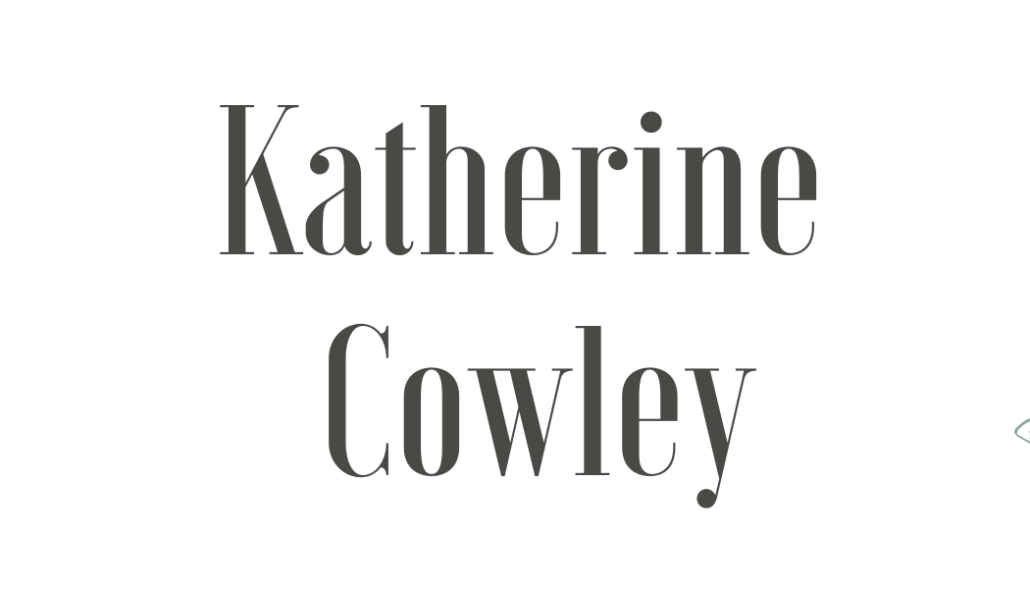
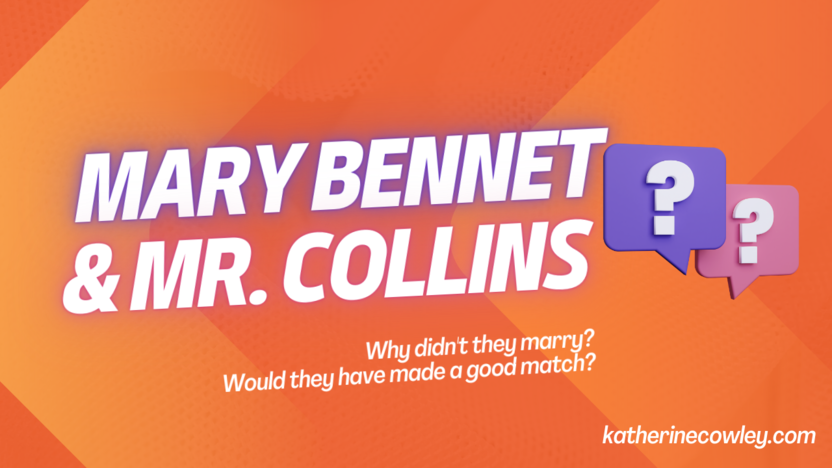
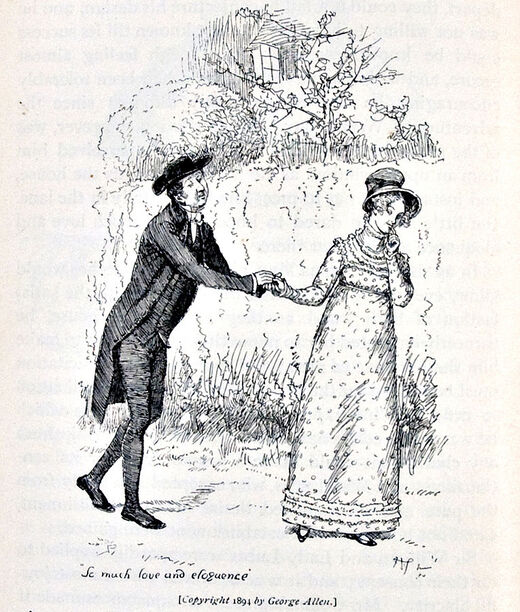
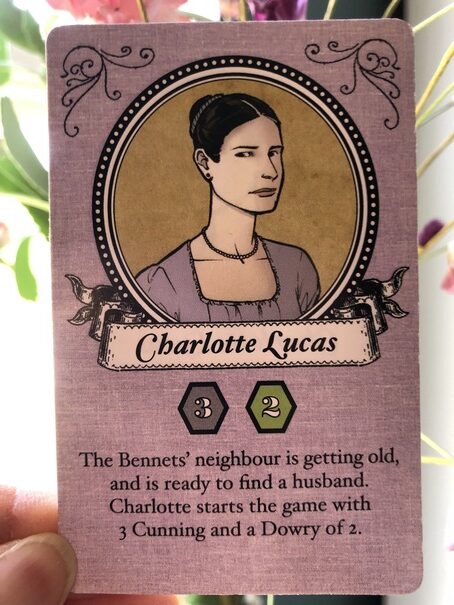
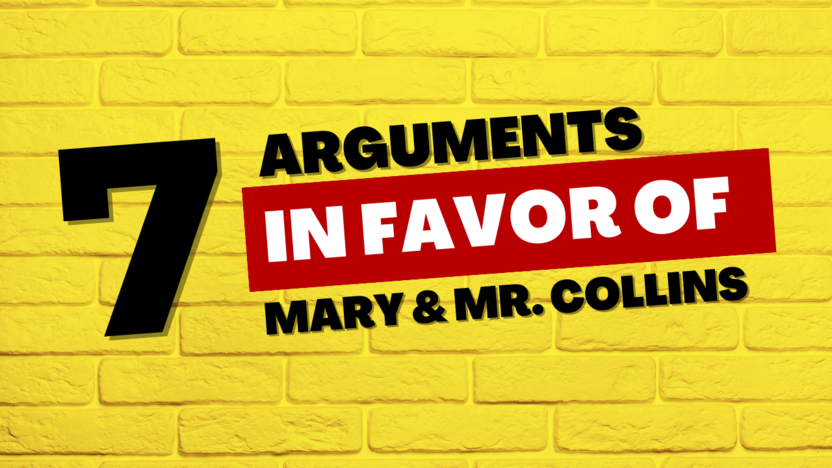
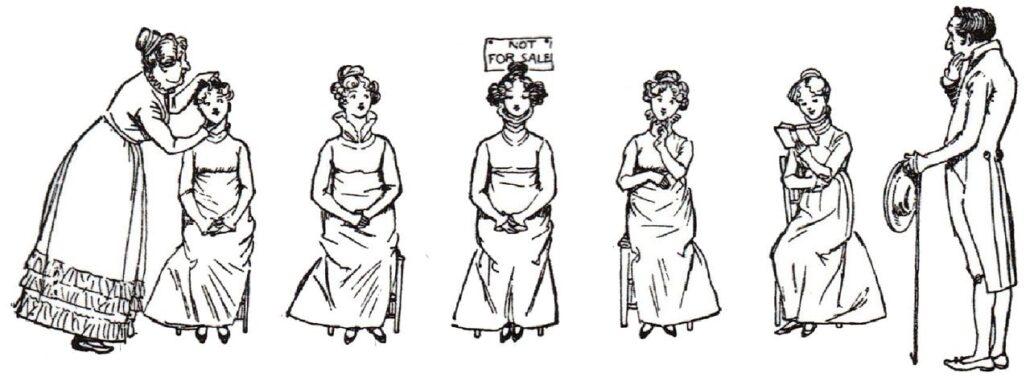
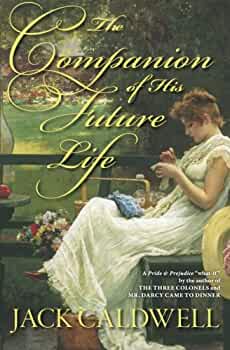
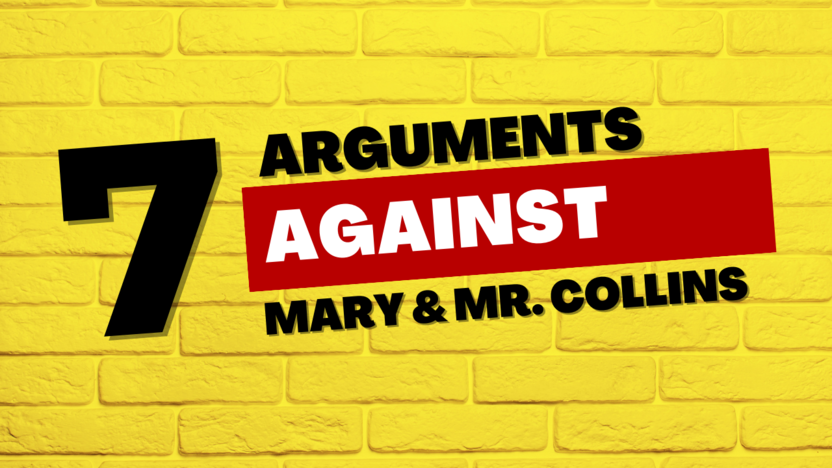
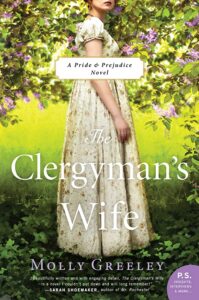
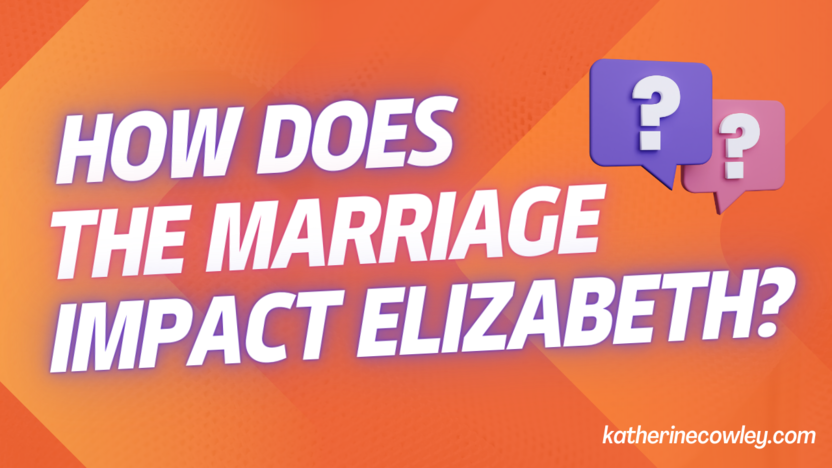
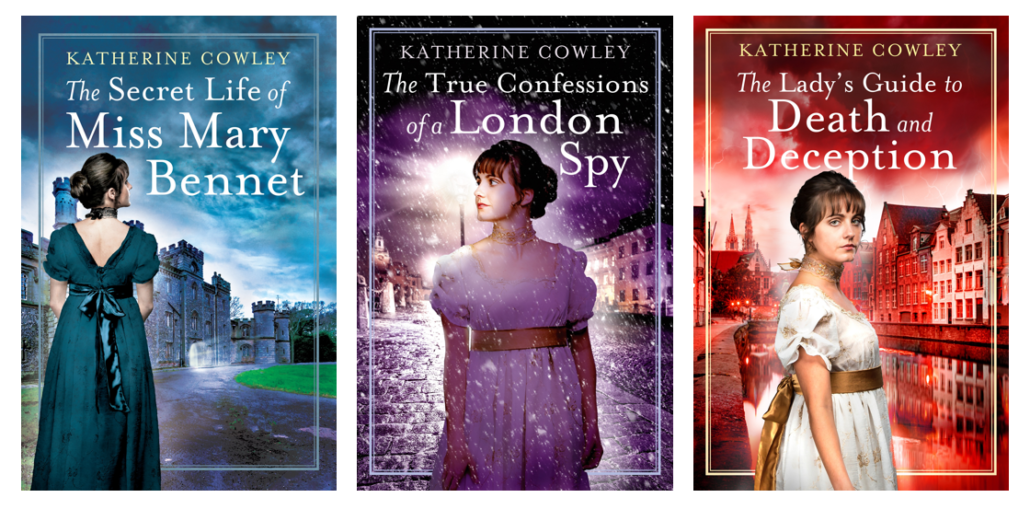


Excellent post! I think Mary and Mr. Collins could make a good match, but I agree with you that it would be better if she had the chance to mature a little more first.
Marriage to Collins would be one if the worst things to happen to Mary, she needs a totally different character to help her get over the treatment from the Bennets. I now refuse to read a Collins and Mary marriage and figuratively thrown the book in the bin.